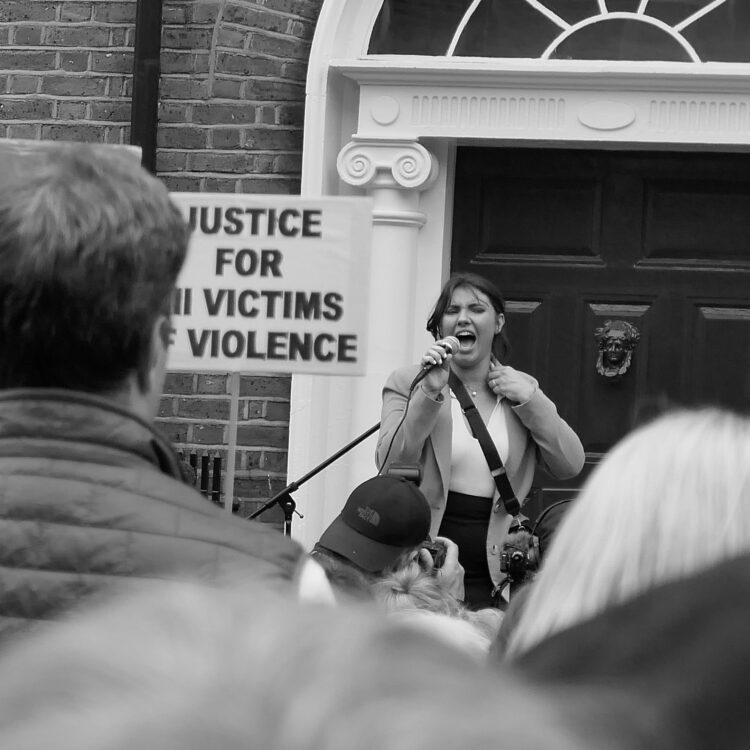Today (28 June) marks two years since the publication of the strategy that was meant to clamp down on domestic, sexual and gender-based violence
The sentencing of Irish Defence soldier Cathal Crotty to a three-year suspended jail term for beating Natasha O’Brien unconscious and then bragging about it on social media has left the country stunned.
Following the hearing, domestic abuse charity Women’s Aid was ‘inundated’ with calls from distressed people who were left furious and frustrated by the ‘triggering’ verdict. Because the reality is, this kind of violent, unjust incident is far from being an isolated one. The news of the verdict also happened to coincide with the launch of Women’s Aid’s 2023 impact report, which revealed over 40,000 disclosures of domestic abuse in just one year – a record high.
Multiple protests have taken place around the country demanding justice for victims and an end to gender-based violence that has left so many of us feeling unsafe on our streets. Politicians have come out in support for Natasha’s bravery in speaking out against the system – she even got a standing ovation in Dáil Éireann – and they have said in no uncertain terms that they are ‘on her side’.
But we’ve heard all of this before. We’ve protested before. In fact, the attack on Natasha in May 2022 occurred just four months after the brutal and tragic murder of 23-year-old Ashling Murphy that provoked mass outrage and even produced a phrase – ‘She was going for a run’ – that went viral around the world.
A little over two years earlier, in December 2019, Irish woman Nadine Lott was ‘beaten to a pulp’ and killed by her former partner Daniel Murtagh in a vicious and sustained assault at her home in Co Wicklow. At the time, a senior Garda was quoted as saying that he never had seen “such a level of violence” inflicted on an individual. The sad thing is, there are countless other women subjected to violence, sexual abuse, intimidation and other forms of terror on a daily basis that never even reach the Irish courts.
So, where does it end? What has to happen before real and lasting change is made once and for all?
Defining zero tolerance
The National Women’s Council (NWC) says unduly lenient sentencing in gender-based violence cases exposes the implementation deficits in the government’s Zero Tolerance Strategy on violence against women in key areas. Today marks two years since the publication of the strategy.
NWC Director Orla O’Connor said: “Over and over again, we see brave women like Natasha O’Brien speaking out against the injustice of the justice system. We really commend them, because it is so difficult to share these traumatic stories. But they shouldn’t have to. Zero tolerance should mean zero tolerance. It shouldn’t mean zero tolerance, except where the perpetrator has a high-status career. Or zero tolerance, except where he’s from a good family. Or zero tolerance, except if someone can vouch for his ‘good character’.”
The National Women’s Council partnered with the government on the development of the Third National (Zero Tolerance) Strategy on domestic, sexual and gender-based violence. Since its publication, they have seen strong gains and have repeatedly called for it to be fully funded and resourced. In the interim, they have published a report on the disconnected nature of the justice systems to which victim-survivors of gender-based violence are exposed to, and we have repeatedly called for comprehensive and practical reforms, including training for all professionals who come into contact with them.
NWC’s Violence Against Women Coordinator Ivanna Youtchak said: “The Zero Tolerance Strategy is excellent in its ambition and it recognises that it is only through a society wide effort that we will achieve real change. But without the proper resourcing, it cannot be effective. And women cannot wait any longer for progress on this issue. There were 40,000 domestic violence calls to Women’s Aid last year alone. Over half of women in Ireland will experience sexual violence in their lifetime. Each and every one of these women deserve justice for what they went through. And society needs to change so women aren’t subjected to male violence in the first place. It is long past time for zero tolerance.”
It has since been reported that Cathal Crotty will be dismissed from the Defence Forces as a result of the assault but the soldier has been given the opportunity to make representations against his dismissal and appeal the decision.
Making lasting change
The implementation of the strategy by Cuan, the new government agency on gender-based violence, must start as soon as possible. The National Observatory on violence against women and girls published at the end of 2023 highlighted major gaps and progress in the implementation, as well as priorities for Cuan.
The NWC is calling for Cuan to be fully resourced in Budget 2025 in order to adequately fund frontline services; to carry out all of its functions to the highest standard; and to ensure a future where women can live a life free from violence.
If you’re currently experiencing domestic, sexual or gender-based violence, visit womensaid.ie or call 1800 341 900.
Main image features Natasha O’Brien speaking outside the Dáil earlier this week during one of the many protests. Photographer: Diarmuid O’Donoghue








